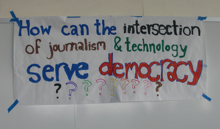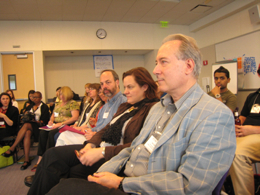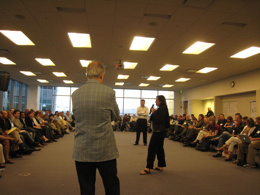
Are you going to be part of the problem or part of the solution? That’s a question you hear a lot when people complain about something that’s gone wrong in our modern world. And there’s a lot of hand-wringing about the future of journalism and whether it will survive its painful transition in the digital age.
But the conference I attended the last couple days, NewsTools2008: Journalism That Matters, is trying to be part of the solution. Put on by Bill Densmore, who runs the Media Giraffe Project at the University of Massachusetts at Amherst, the goal of NewsTools2008 was to bring together journalists, web developers, entrepreneurs, academics and students to discuss technology’s disruption of journalism — and collaborate on ways to harness it for good.
Initially, I was hoping to live-blog the conference for MediaShift, but a couple things changed my mind on that: 1) I could not get Internet access at the conference, despite it being at Yahoo’s Sunnyvale, Calif., headquarters; 2) there were so many breakout sessions it was impossible to cover them all. Instead, I think it’s worth giving you an overview of my experience after the fact. (Note: The conference continues today, Drupal Day, and on Saturday, but I won’t be able to attend. There’s a live video stream here.)
Usually, I go to conferences like this as a reporter/blogger, hoping to sum up what people say, do a few interviews and come up with more story ideas. But this time, I shifted gears and found myself actually participating in the conference as someone who wanted to learn more. The high quality of the attendees and the almost spontaneous ways that discussions took place made it much more valuable than the usual four-people-pontificate-from-a-dais format of most conferences.
Let me explain. I had been at “unconferences” before such as BloggerCon, where the group discusses things and there is one moderator for the discussion. However, NewsTools2008 took on the BarCamp format for discussion, allowing any participant to create their own discussion topic, post it on a whiteboard, and then have a group of people stop by to chat. There were anywhere from 15 to 20 discussions going on throughout the day, on topics ranging from “What tools or technology are getting in your way?” to “I have a great idea. How do I fund it?”
Turning Around Early Expectations
On Wednesday night, the conference tone was set with a chat by Dan Gillmor of Arizona State University, Mary Hodder of Dabble, and Bill Gannon of LucasFilm. Hodder talked about the importance of “metadata” (descriptions of content) and “microformats” (open formats of our personal data so that any software can read it). Gannon praised Yahoo News, where he used to work, saying that “aggregation is creation” and that everyone should be linking and doing aggregation — even original news sources.

Then, with 60 second intros, people jumped up to announce the 10 topics for breakout sessions that evening. It was very difficult to follow who they were and what they were going to discuss. Even titles such as “data mashups and portability” were hard to comprehend — although that was the one that I attended. It was a little hectic and rapid-fire.
That night over drinks with a few attendees, I looked at the schedule for the next day. There was a three-hour slot with this vague description of what was happening: “Throughout the day, session topics will begin and end at times established by the convenors.” Huh? I wondered whether the conference was too technical, and too difficult for me to follow as a reporter or live-blogger.
But what other people told me was interesting. If there was an open slot on the schedule, I (or anyone) could simply post a discussion topic and then convene with other people to discuss it. Some startups decided to demo their sites. Others wanted to talk about burning topics. The point being: You couldn’t really complain about this type of unconference because you are the one in charge of its content.
On Thursday, the setup was a bit more organized, with topics posted on a huge whiteboard so you could find the topic you liked, and then find where they were meeting. I decided to skip doing any live-blogging, and not be my usual voyeur at this conference. Instead, I followed my own interests and went to sessions that might help me improve MediaShift and Idea Lab.
The first session I attended was called “Building the Audience,” focused on how sites can bring more traffic, add conversation and build a loyal community. The mix of people was great, with a few site publishers, someone from Yahoo and another from DailyMe, a personalized news aggregator.

Among the advice given for building audience:
> Use social media buttons on your site, but also seed Digg with suggestions.
> Syndicate your content outside of your site. Get it out on RSS, widgets, badges — let people run headlines from your site on their site.
> If you do an audio or video podcast, break it up into 5 minute chunks, and you’ll get people to consume much more content.
> Include text descriptions of what’s in a video or audio piece.
> If you want to reach a larger audience, try out new marketing messages that resonate with the new audience — without alienating your current base.
Later, I attended a session called “Student Stringers” about having students help with sites as freelancers or interns. That’s something I’m considering at MediaShift. That group included professors, media outlets that had intern programs, as well as three students. The discussion was led by Michael Melillo, CEO of SocialChord, a site that’s trying to set up social networks for towns.
Melillo wanted to have a group of local high school and college students in New Jersey do a collaborative news story on the way their town was being gentrified. There was an issue around ethics that came up a few times: Shouldn’t the students be paid fairly for their work?
The students themselves had this to say about what internships they would want to take on: The jobs had to provide exposure, or decent pay, or mentoring by helping them learn more. One exception was if the project was something aligned with the student’s passion — then students would be more than willing to give their time without pay.
One student was more focused on technology than journalism, and said passion was not a driving factor for him. He was more interested in learning a new skill or being challenged by a tech project — not just doing data entry or other grunt work. Of course, if a big media organization was the one calling on them, they would be open to doing just about anything to have that outlet’s name on their resume.
*****
Later in the afternoon, I spent some time out in the hallway chatting with people and met Scott Karp from Publish2, someone I had corresponded with but hadn’t seen in person. I had that experience multiple times at the conference, especially with the high number of Idea Lab bloggers who were there. Karp told me that he was just sitting out in the hallway lounge area on his computer, and a different group of people would stop by and start discussing things. He was running his own virtual discussion group with a rotating cast of participants.
I think that was the strongest point of NewsTools2008: If you can get a great group of people to attend a conference, and then let them discuss matter that they think are important, you can satisfy a lot more people. I noticed that the discussion groups were pretty good about allowing everyone to bring up their own situations and issues, with a very collaborative feel for solutions.
I often prefer the unconference style to the more formal conference, and this newer way of doing discussions was something I really enjoyed, especially the way it tended to include people rather than exclude them. And when you have a lot of smart people in a room, it’s better to harness all their intelligence than cede it to a select few who end up hogging the microphones.
What do you think? Did you attend NewsTools2008 or watch the streaming video online? What were some of its strengths and weaknesses? How do you think tech folks and journalists should collaborate? Share your thoughts in the comments below.
Photo of sign by Wayne MacPhail via Flickr. Other photos by Mark Glaser.

Mark– it was nice to meet you, finally. Yes, the discussion format was pretty neat; I’m not sure if there’s a name for the technique.
Interesting crowd, and interesting folks. One of my aims was to help advance the common classification effort– there wasn’t a session for that here, but it came up enough and we’ll be trying to carry that forward.
Jon
Thanks for the kudos; it is great to know that NewsTools worked for you. Just a word about the conference process that we used on Thursday and Friday…it is called Open Space Technology and is the forerunner to unconferences. You can find more information about OST at http://www.openspaceworld.org. I’ve also got a bit more information about it at http://www.opencirclecompany.com. Kaliya Hamlin has been using it extensively in the tech community and blogs about it at http://www.unconference.net.
A video of you: http://youtube.com/watch?v=eiYCN52xwPY
Mark: Sorry we didn’t get to meet in person, but maybe at MIT in June?
Thanks for capturing many of my own (and other folks’) sentiments around NewsTools2008. As you described, the Unconference takes a little getting used to. I have seen it done really well and really poorly, and I think NewsTools2008 did a really admirable job.
Cheers,
paul